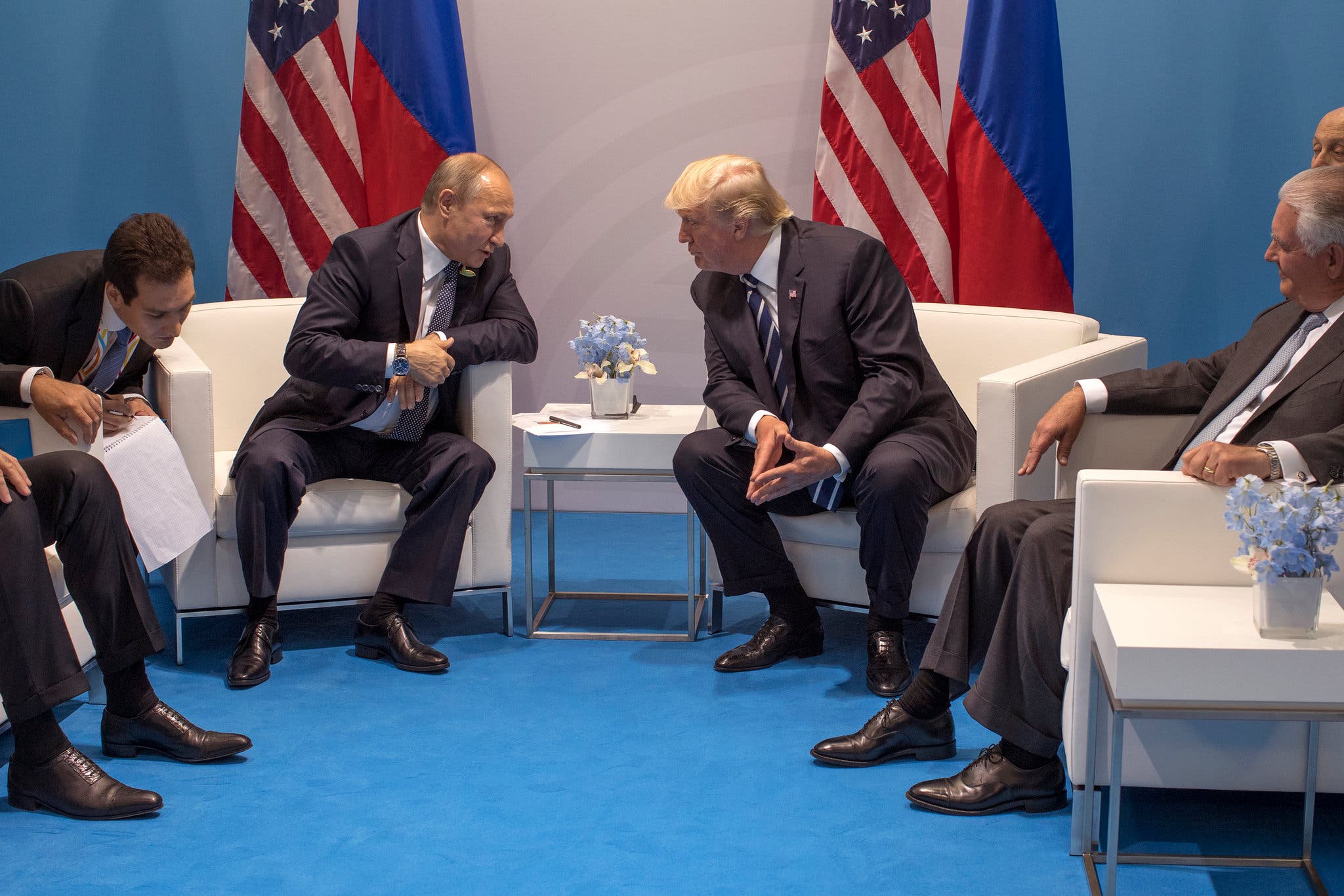Russia Sanctions On The Table As Trump-Putin Relationship Worsens

Table of Contents
The Triggering Events: Why Sanctions Are Being Considered
Several key events and ongoing situations have fueled calls for increased sanctions against Russia. These actions are seen by many as violations of international law and norms, justifying a stronger response from the international community.
-
Recent allegations of Russian interference in the 2020 US Presidential election and other democratic processes: Reports of sophisticated disinformation campaigns and cyberattacks aimed at influencing elections in various countries have raised serious concerns about Russia's attempts to undermine democratic institutions globally. These actions are considered a direct threat to national security and global stability.
-
Escalation of the conflict in Ukraine: Russia's annexation of Crimea in 2014 and its ongoing support for separatists in eastern Ukraine have destabilized the region and led to significant loss of life. The continued aggression violates Ukraine's sovereignty and international agreements.
-
Violation of existing arms control treaties by Russia: Concerns over Russia's non-compliance with key arms control treaties, such as the Intermediate-Range Nuclear Forces (INF) Treaty, have raised fears of a new arms race and increased global insecurity. This disregard for international agreements undermines the framework for strategic stability.
-
Human rights abuses within Russia and its sphere of influence: Reports of widespread human rights violations, including political repression, suppression of dissent, and extrajudicial killings, have drawn international condemnation. These abuses are seen as a violation of basic human rights and a challenge to international norms.
-
Continued support for the Assad regime in Syria and proxies in other conflicts: Russia's military intervention in Syria and its support for authoritarian regimes in other regions have been criticized for exacerbating conflicts and undermining efforts to promote peace and stability. This involvement is seen as contributing to regional instability and humanitarian crises.
These actions, characterized by Russian aggression and international law violations, have created a climate ripe for the imposition of further sanctions. The severity of these actions and their potential impact on international stability are driving the push for stronger measures.
Types of Sanctions Under Consideration
Several types of sanctions are currently under consideration, each with the potential to significantly impact Russia's economy and its global influence. The specific package ultimately implemented will depend on the severity of the perceived threat and the geopolitical context.
-
Financial sanctions targeting Russian banks and oligarchs: These sanctions could freeze assets, restrict access to international financial markets, and limit the ability of Russian entities to conduct transactions globally. This type of economic warfare aims to directly impact the financial power of the Russian state and its elites.
-
Energy sanctions restricting Russian oil and gas exports: Given Russia's reliance on energy exports, targeting this sector could have a profound impact on its economy. This could involve restrictions on imports of Russian energy or limitations on investment in the Russian energy sector. However, such sanctions could also significantly impact global energy prices, leading to unintended consequences.
-
Technological sanctions limiting access to crucial technologies: Restricting access to advanced technologies, particularly in sensitive sectors like defense and aerospace, could severely hinder Russia's technological development and military capabilities.
-
Diplomatic sanctions involving expulsion of diplomats and travel restrictions: These actions are aimed at signaling disapproval and limiting diplomatic engagement with Russia. They serve as a symbolic but important signal of international condemnation.
-
Sector-specific sanctions targeting key industries: Sanctions can be tailored to target specific industries, such as defense, mining, or finance, based on their importance to the Russian economy and their potential to contribute to destabilizing actions. This approach allows for a more targeted and potentially less disruptive application of economic pressure.
These potential sanctions represent a wide range of tools aimed at applying economic pressure and diplomatic pressure on Russia. The ultimate choice of which sanctions to implement will be a complex decision with significant geopolitical ramifications.
The Potential Economic Impact of New Sanctions on Russia and the Global Economy
The imposition of new sanctions on Russia would undoubtedly have significant economic consequences, both for Russia and the global economy. The magnitude of these impacts will depend on the breadth and depth of the sanctions regime.
-
Impact on the Russian Ruble: New sanctions could lead to a sharp devaluation of the Russian ruble, further exacerbating existing economic challenges.
-
Effects on Russian energy exports and global energy prices: Restrictions on Russian energy exports could disrupt global energy markets and lead to significant price increases, potentially triggering inflation globally.
-
Consequences for international trade and investment: Sanctions could discourage foreign investment in Russia and disrupt existing trade relationships, harming economic growth both within Russia and internationally.
-
Potential for increased inflation and economic instability: The economic fallout from sanctions could lead to higher inflation rates and increased economic instability, not only in Russia but also in countries heavily reliant on Russian energy or trade.
-
Ripple effects on global supply chains: Disruptions to Russian energy and commodity exports could have ripple effects throughout global supply chains, leading to shortages and price increases for various goods and services.
The economic fallout from new sanctions is likely to be significant, creating market volatility and potentially contributing to inflationary pressures worldwide. The interconnected nature of the global economy means that the consequences will extend far beyond Russia's borders.
International Response and Geopolitical Implications
The imposition of new sanctions on Russia will inevitably trigger a response from other countries and international organizations. The geopolitical implications of such actions are far-reaching and complex.
-
Reactions from European Union members: The EU's response will be crucial, as it is a major trading partner of Russia. A unified approach is essential to maximize the impact of sanctions and minimize potential negative consequences for European economies.
-
Stance of other key global players (China, etc.): China's response will be particularly important, given its growing economic ties with Russia. China's position on sanctions could significantly influence their effectiveness.
-
Potential for further escalation of tensions: New sanctions could lead to further escalation of tensions between Russia and the West, increasing the risk of military conflict.
-
Impact on NATO and other international alliances: Sanctions could strengthen resolve within NATO and other alliances but could also lead to divisions among member states with differing economic interests.
-
Consequences for arms control agreements: The existing fragile state of arms control agreements could be further undermined by increased tensions and a lack of cooperation between Russia and the West.
International relations will be significantly impacted by the implementation of Russia sanctions. Navigating the geopolitical implications requires careful consideration of the potential consequences for global stability and cooperation.
Conclusion:
The worsening Trump-Putin relationship is significantly increasing the likelihood of substantial new sanctions against Russia. The potential triggers, ranging from election interference allegations to ongoing geopolitical conflicts, are numerous and serious. Understanding the types of sanctions under consideration, their potential economic impacts, and the international reactions they will likely provoke is crucial for navigating this complex geopolitical landscape. Staying informed about developments regarding Russia sanctions is paramount. Follow reputable news sources and analysis to stay updated on this ever-evolving situation and understand the implications of further Russia sanctions and the evolving Trump-Putin relationship.

Featured Posts
-
 Angels Loss To Yankees Kochanowiczs Single Inning Struggle
May 28, 2025
Angels Loss To Yankees Kochanowiczs Single Inning Struggle
May 28, 2025 -
 Shortstop Injuries Define Angels Dodgers Matchup Angels Win
May 28, 2025
Shortstop Injuries Define Angels Dodgers Matchup Angels Win
May 28, 2025 -
 Fenerbahce Ye Transfer Cagrisi Danimarka Dan Ronaldo Ya Seslenildi
May 28, 2025
Fenerbahce Ye Transfer Cagrisi Danimarka Dan Ronaldo Ya Seslenildi
May 28, 2025 -
 Hugh Jackmans Support For Blake Lively And Ryan Reynolds Against Justin Baldoni
May 28, 2025
Hugh Jackmans Support For Blake Lively And Ryan Reynolds Against Justin Baldoni
May 28, 2025 -
 Planning Your Trip To Wrexham Accommodation Transport And More
May 28, 2025
Planning Your Trip To Wrexham Accommodation Transport And More
May 28, 2025
